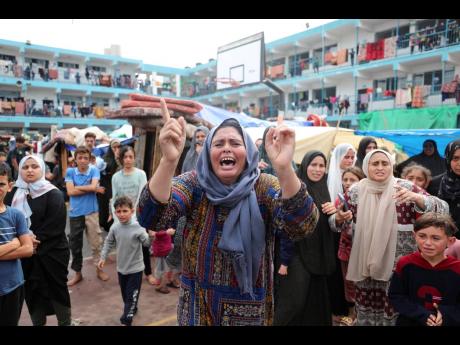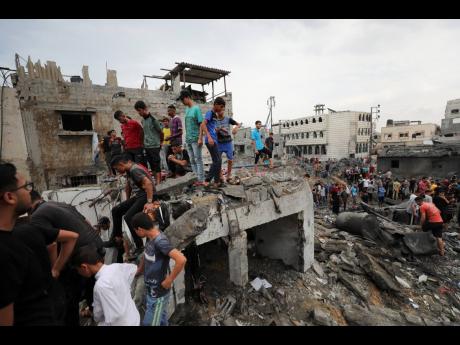Imani Tafari-Ama | Palestine: Paying the price of war
Violence in any shape or form is an inappropriate mechanism of human communication. Whether it is committed by an aggressor or a defender, violence is an indicator that something has gone wrong in the interaction between the entities engaged in this relationship. Whenever this monster rears its ugly head in interactions at the interpersonal, household, community, national, international, regional or global levels, it should be interrogated. In this way, the parties concerned have an improved chance of arriving at reasonable solutions.
Root causes of violence should also be identified before attribution of blame and condemnation. As justice systems have established, when violence is used as a mechanism of defence against aggression, there may also be just cause for exonerating parties who have caused harm in an act of self-defence. Enslaved Africans who revolted against their oppressors exemplified the exceptional use of violence to produce the human rights model.
In condemning the October 7 attack by Hamas on Israel, Prime Minister Andrew Holness did not mention the history of apartheid that has characterised Israeli governance of the Palestinians in the occupied Palestinian territories (OPT) for over 70 years. This is important for analytical framing of the subsequent events. While not condoning the brutality of the attack, it is worth noting that violence begets violence. The Hamas assault was not as unprovoked as the dominant discourse in the media would have us believe. It was indiscriminate but was in response to decades of their violent domination by Israel.
INEXCUSABLE
The relentless Israeli bombardment of Gaza in retaliation for Hamas’ attack was inevitable but is still inexcusable. One thousand four hundred Israeli deaths have been recorded, and the rapidly rising number of Palestinians killed was 5,800 and growing, at time of writing. The physically injured on both sides exceed 20,000 while the trauma engendered is likely to reverberate for generations to come.
Since that fateful Saturday, Gaza has lost access to electricity, fuel, food, and water. The infrastructure has crumbled under the weight of the daily bombardment. Along with the material losses, there is diminishing hope of either civilians or militants escaping harm. Though the defenceless population is on the run, they cannot hide from the superior power of the Israeli forces.
This war makes one wonder if Hamas’ skirmishes were suicidal overtures from desperate, war-weary militants. They have no answer to their imminent decimation in response to their own vicious killing of innocent partygoers and the taking of vulnerable citizens as hostages. Leveraging hostages to negotiate for a ceasefire seems lame, if not laughable, under these dire circumstances.
Historically speaking, death, fear, destruction, and hate have dogged both sides for decades. Ever since Britain colonised the Palestinians in its heady colonial heyday in the early 20th century, Palestinians have been under siege. Then, at the end of the Second World [European] War, Britain facilitated the removal of Palestinians from their homeland to make way for the European Zionists who named themselves Israelites. The Ashkenazi Jews call themselves Israelis, an important distinction.
The United States of America (USA) collaborated in the decision to make Palestine the homeland for the state of Israel after the systematic suffering of Jews in the short period of the Nazi German Holocaust. None of the United Nations’ (UN’s) humanitarian resolutions have prevented Israel from usurping the sovereign state of Palestine. Israel has continuously transgressed settlement agreement boundaries under its own brand of brutal rule.
Subsequently, several territorial wars were fought in the Middle East, with Israel emerging as supreme strategist and territorial victor. These conflicts include the epic Six Day War in 1967, which involved Israel, Egypt, Syria, and Jordan in a bloody and costly battle.
‘DOWNPRESSION’
Hamas’ own brand of viciousness was bred in the bowels of ‘downpression’, in Rastafari parlance. The October 7 onslaught showed that even a worm will turn. For decades, Palestinians have been desperate for release from entrenched military, psychosocial and socio-economic domination. However, the advantage of surprise brought on by the October 7 attack was short-lived. Politically, though, the skirmish spotlighted the Palestinians’ plight and rallied global support, as indicated by massive ceasefire demonstrations in several countries.
War is a bloody mess and Hamas’ response to Palestinian imprisonment life in Gaza was a death knell for peace. In contrast, the approach adopted by South Africa’s African National Congress (ANC), in retaliation against apartheid, sought to minimise civilian casualties (collateral damage) when militants engaged in sabotage. The planting of bombs aimed at military and government targets, minimised civilian casualties while strategically courting global public support. Consequently, although some critics labelled the ANC freedom fighters as “terrorists”, they studiously avoided behaving as such. Beyond the antics of semantics, the flesh-melting weaponry being used by Israel in its unrelenting bombing of civilian targets begs the question that terrorism and war crimes are intimate bedfellows of the Israeli military machinery.
Given its midwife role in the creation of the Israeli state, the USA is blindly loyal to its offspring. The USA has long declared Hamas a terrorist organisation without any qualification. The White House was lit with the colours of the Israeli flag and the president declared wholehearted commitment to providing the resources that Israel needs to crush its opponents.
Without a doubt, there will be no Hamas triumph at the end of this sad saga. There was a humanitarian crisis in Gaza before the October 7 attack, and the search for a two-state solution to the ongoing and everyday citizen security crisis is becoming more remote by the second. International security watchdogs are also counting casualties while the USA vetoes UN ceasefire resolutions. Even if Hamas shot itself in the foot with its super-surprise move, there should be boundaries to Israel’s right to defend itself.
The use of violence in resistance to colonial oppression is qualitatively different from the violence applied by aggressive regimes hell-bent on subjugation. Historically speaking, those who dominate have wielded supremacy by using violence to maintain power. Control of the narrative, especially in the media, also ensures that the aggressor can manipulate the representation of events and maintain authority on the subject. In a double-speak reversal, Israel is now painting itself as the victim, with Hamas conjugated as the unqualified aggressor.
It is time for a détente. To quote the Temptations’ rhetorical conclusion, “War: what is it good for? Absolutely nothing!”
Imani Tafari-Ama, PhD, is a Pan-African advocate and gender and development specialist. Send feedback to i.tafariama@gmail.com


